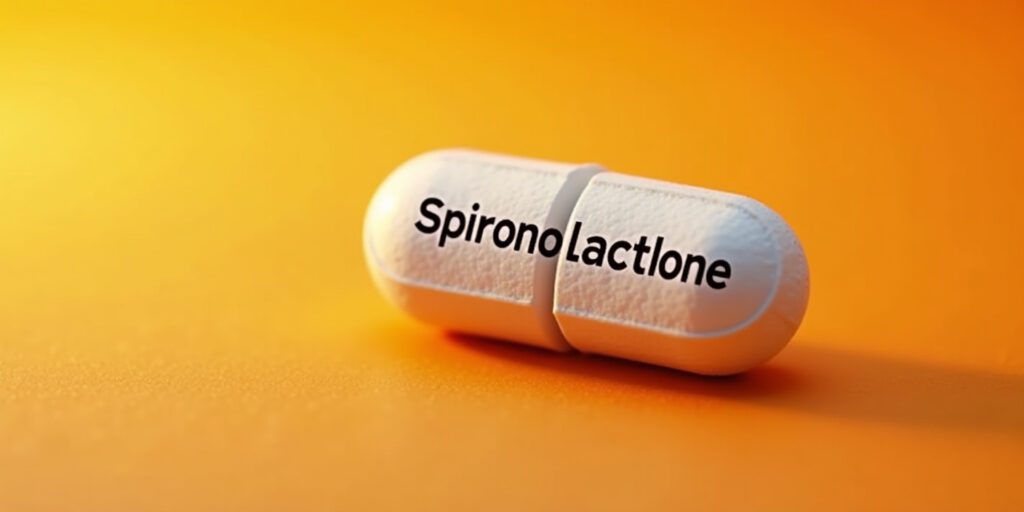Spironolactone is widely prescribed for conditions like hormonal acne, polycystic ovary syndrome (PCOS), and high blood pressure. But if you’ve been wondering, does spironolactone cause weight gain if you don’t sweat?—you’re not alone. Many people worry about weight fluctuations when taking this medication, and the role of sweating in the process adds another layer of confusion.
Understanding Spironolactone: What Does It Do?
Spironolactone is a potassium-sparing diuretic, meaning it helps your body get rid of excess water while retaining potassium. Doctors often prescribe it for fluid retention, high blood pressure, and hormone-related conditions like PCOS. But a frequent concern among users is: does spironolactone cause weight gain if you don’t sweat?
To understand this, we need to break it down into two factors: weight gain and sweating.

Can Spironolactone Cause Weight Gain?
Spironolactone is not traditionally linked to weight gain. In fact, as a diuretic, it typically causes mild weight loss by reducing excess water in the body. However, some people report unexpected weight changes. So, does spironolactone cause weight gain if you don’t sweat? The answer isn’t straightforward.
Possible Reasons for Weight Gain While on Spironolactone:
- Water Retention vs. Fat Gain – Spironolactone helps eliminate excess fluid, but if your body isn’t flushing out water efficiently (which sweating can aid), you might feel heavier.
- Hormonal Fluctuations – The drug impacts hormones, especially androgens. Some people might experience slight weight shifts due to changes in metabolism.
- Increased Appetite – Though not common, some users report feeling hungrier, which could contribute to weight gain.
- Muscle Mass vs. Fat – Some users report bloating or feeling “puffier,” which could be due to muscle retention rather than fat accumulation.
But what about sweating? Does spironolactone cause weight gain if you don’t sweat? Let’s look at the role of sweating in weight management.
The Role of Sweating in Weight Regulation
Sweating is your body’s natural cooling mechanism, but does it help regulate weight? Does spironolactone cause weight gain if you don’t sweat? Here’s how sweating plays a role:
- Fluid Balance: Sweating helps release excess water and sodium. If you’re not sweating much, your body may hold onto extra fluid.
- Caloric Burn: Sweating itself doesn’t burn fat, but it usually occurs during physical activity, which burns calories.
- Toxin Elimination: While minor, sweating helps flush toxins that may impact metabolism.
If you’ve noticed weight gain and you’re not sweating much, you might ask: does spironolactone cause weight gain if you don’t sweat? or is there another reason?

Does Spironolactone Cause Weight Gain? Science vs. Personal Experiences
If you’re taking spironolactone, you might hear different opinions about its effect on weight. Some people say they’ve gained weight, while scientific studies suggest otherwise. So, what’s the truth? It’s important to separate personal experiences from research-backed facts.
Here are a few key things to keep in mind:
- Medical guidelines, like those from the Wilderness Medical Society, provide reliable information.
- Weight gain and breast enlargement are possible side effects, but they don’t happen to everyone.
- Everyone’s body reacts differently based on health conditions and lifestyle.
If you’re using spironolactone, be patient and keep track of how your body responds. Regular check-ins with your doctor can help you manage any changes effectively.
Research & Data: What Studies Say
There isn’t direct scientific evidence linking spironolactone to weight gain due to lack of sweating. However, studies show:
- Diuretic Effect: A study in the Journal of Clinical Endocrinology found that spironolactone helps reduce fluid retention, suggesting that weight gain is unlikely unless other factors are at play.
- PCOS & Weight: Research in The Journal of Women’s Health suggests that spironolactone aids in weight management for PCOS patients by balancing hormones.
- Exercise & Sweating: A Harvard study found that people who sweat more tend to have better fluid regulation and metabolism, meaning a lack of sweating could influence weight retention slightly.
So, does spironolactone cause weight gain if you don’t sweat? While not a direct cause, lack of sweating may contribute to temporary fluid retention.
How to Manage Weight While Taking Spironolactone?
If you’re worried about does spironolactone cause weight gain if you don’t sweat? here are some strategies:
- Stay Hydrated – Drinking water helps flush out excess fluids even if you’re not sweating much.
- Exercise Regularly – Even light activity can help regulate weight, regardless of sweating levels.
- Monitor Your Diet – Avoid excess sodium, which can contribute to fluid retention.
- Consult Your Doctor – If weight gain is concerning, discuss possible dosage adjustments or alternative medications.
Does Spironolactone Cause Weight Gain If You Don’t Sweat?
The simple answer is: Not directly. Spironolactone itself doesn’t cause fat gain, but if you’re not sweating much, you may retain more fluid, leading to a temporary increase in weight.
If you’ve been asking, does spironolactone cause weight gain if you don’t sweat?, rest assured that while sweating plays a role in fluid balance, it’s not the sole factor in weight management. Staying active, hydrating well, and maintaining a balanced diet are the best ways to manage your weight while taking this medication.
If you have personal experiences with spironolactone and weight changes, let us know in the comments! And remember, when in doubt, always check with your healthcare provider!
























